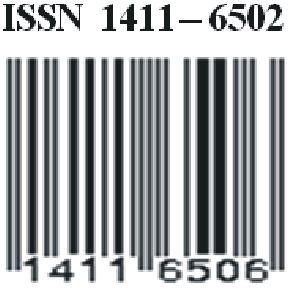Pengaruh Katalis Asam Klorida dan Media Natrium Klorida Terhadap Sintetik Polieugenol dari Minyak Cengkeh (Syzygium aromaticum)
(1) Universitas Negeri Makassar
(2) Universitas Negeri Makassar
(3) Universitas Negeri Makassar
(*) Corresponding Author
DOI: https://doi.org/10.35580/chemica.v17i2.4683
Abstract
ABSTRAK
Penelitian ini bertujuan untuk mengetahui bagaimana pengaruh penambahan katalis asam klorida (HCl) terhadap sintetik polieugenol, bagaimana pengaruh penggunaan media NaCl terhadap sintetik polieugenol, serta kelarutan polieugenol dalam beberapa pelarut murni. Polieugenol yang akan disintesis berasal dari minyak cengkeh (Syzigium aromaticum) yang diperoleh dari kabupaten Soppeng. Tahapan penelitian ini terdiri dari (1) isolasi minyak atsiri dari bunga cengkeh dengan metode ekstraksi kontinu dan water distillation, (2) ekstraksi eugenol dari minyak atsiri bunga cengkeh yang dikarakterisasi dengan penentuan rendemen, analisis GC-MS, serta analisis dengan spektrofotometer inframerah (IR), dan (3) polimerisasi eugenol dengan katalis asam klorida yang dikarakterisasi dengan penentuan kelarutan, rendemen, serta analisis spektrofotometer IR. Hasil yang diperoleh menunjukkan bahwa rendemen terbesar hasil polimerisasi diperoleh pada perbandingan mol HCl dan eugenol 1 : 2, yaitu 87,21 % pada polimerisasi eugenol dengan media NaCl dan 86,56 % pada polimerisasi eugenol tanpa media. Selain itu diketahui pula bahwa polimerisasi eugenol dengan menggunakan media NaCl tidak terjadi dengan sempurna, dikarenakan proses adisi pada tahap inisiasi terganggu karena ikutnya media tersebut bereaksi yang dibuktikan oleh masih terdapatnya serapan khas gugus C=C pada bilangan gelombang 1606,70 - 1637,56 cm-1, sehingga lebih baik melakukan polimerisasi eugenol tanpa menggunakan media.
Kata Kunci : Polieugenol, Bunga Cengkeh, Eugenol, HCl, Polimerisasi, dan Sintetik
ABSTRACT
The aim of this research was to know about the influence of chloride acid (HCl) addition as a catalyst toward the polyeugenol synthesis, about the influence of sodium chloride (NaCl) medium usage toward polyeugenol synthesis, and about the solubility of polyeugenol in some pure solvents. The polyeugenol was made from clove oil which obtained from Soppeng regency. This research consists of several stages, i.e (1) the isolation of essential oil from clove’s flower using continuous extraction method and water distillation, (2) the extraction of eugenol from clove’s oil which characterized with yield determination, GC-MS analysis, and infrared (IR) spectrophotometer analysis, and (3) polymerization of eugenol using chloride acid which characterized with solubility determination, yield determination, and IR spectrophotometer analysis. The result of this reaserch showed that the largest yield was obtained from ratio of mol HCl and eugenol as 1 : 2, was 87,21 % on polymerization of eugenol with NaCl medium and 86,56 % on polymerization of eugenol without using medium. Also note that polymerization of eugenol with using NaCl medium was unsuccessful, due to the addition process on inisiation step was disturbed, because the medium joined in the reaction that proved by typical C=C absorption on 1606,70 – 1637,56 cm-1, so would be better to polymerize eugenol without using medium.
Keywords : Polyeugenol, Cloves, Eugenol, HCl, Polymerization, and Synthesis
Full Text:
PDFArticle Metrics
Abstract view : 1162 times | PDF view : 2200 timesRefbacks
- There are currently no refbacks.
ISSN: 2722-8649
Diterbitkan oleh Jurusan Kimia FMIPA Universitas Negeri Makassar (UNM) dua kali dalam setahun yaitu bulan Juni dan Desember.
Alamat Redaksi :Jurusan Kimia, Fakultas MIPA UNM, JL. Dg. Tata Parangtambung, Makassar 90224 Indonesia, Telp. 0411-840295; Fax: 0411840295;E-mail : chemica@unm.ac.id




